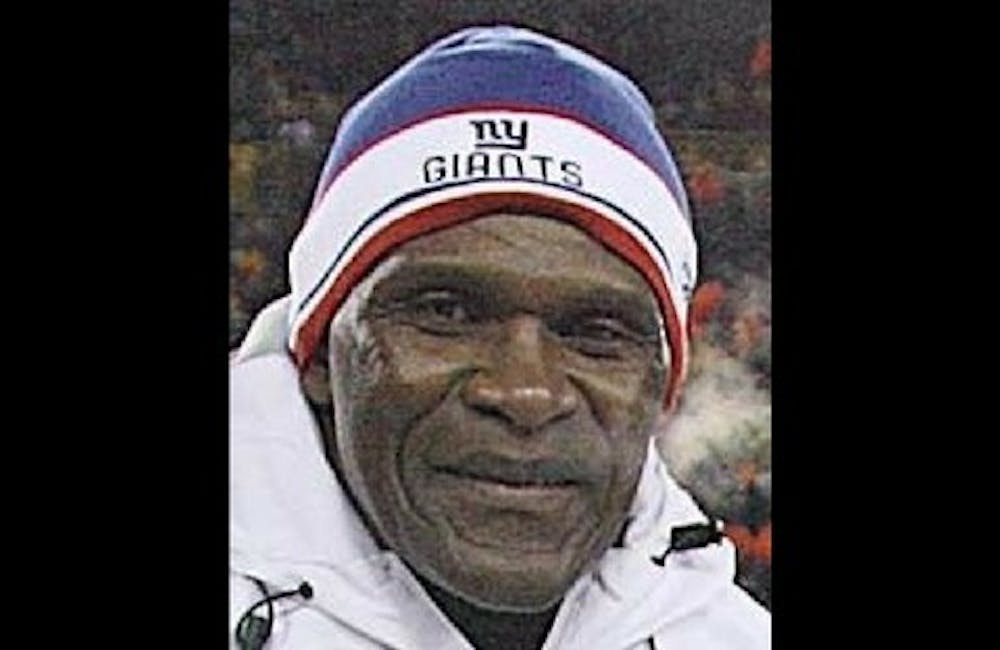Harry Carson sits in the first row listening for more than four hours.
He rarely speaks as Duke public policy professors, economists and biomedical engineers take turns discussing the health effects and future of the game he dedicated more than 20 years to. Around Carson in the brightly lit Duke Law School lecture hall, more than 30 people sit in the audience for the all-day-long talk on head trauma in football.
The speakers discuss Chronic Traumatic Encephalopathy, the debilitating and degenerative brain disease found in deceased football players. They brainstorm whether universities will begin to drop the game for safety concerns. In the audience, some local youth football coaches acknowledge the need to make the game safer. Still other people say football is too important for building teamwork and leadership to ever ban. All the while, Carson sits, taking it all in.
Carson is big. He’s not the muscular, powerful middle linebacker that he was 30 years ago. But at 6’3, the 64-year-old still has a towering presence that commands attention in a room. Today, he wears jeans and a navy sport jacket above a pink button-down shirt and black tie.
When it’s finally his turn to speak in the last hour of the event, he refutes the arguments of several of the previous speakers. And he offers a perspective nobody else in the room can share.
Carson played 13 years in the National Football League. He won a Super Bowl, gained the reputation as one of the hardest-hitting defenders in the league and was ultimately inducted into the NFL Hall of Fame.
He says he also sustained more than 12 concussions throughout his entire career. And after retiring, he was diagnosed with Post Concussion Syndrome, a disorder in which symptoms like dizziness and headaches persist for months and years after a concussion. Today, he experiences migraines, sensitivity to bright lights and loud noises and sometimes struggles to find words to express his thoughts—all symptoms of head trauma.
He knows other former players who suffer through worse. Some are suicidal. Others drink alcohol excessively to mask their depression and other symptoms. As Carson puts it, I’m seeing “all the carnage that goes on around me.” And those experiences have made him outspoken about the dangers of playing football.
Carson’s talk—moderated by James Coleman, Duke’s John S. Bradway professor of law—is supposed to be about whether changing football rules could make the game safer. When Carson first begins, he compares himself to Oprah—“What I know, I know well.” He disagrees that the game can become safer. Better helmets and tackling techniques will not help, he says, challenging arguments by previous speakers.
He adds that he understands “probably more than anybody else in this room the lessons that you learn and take away from the game.” But then he points to his withered shoulder, which degenerated after a tackle in the 80s damaged his nerve. I’ve compensated for it, but you only have one brain, he says. And if he had to live life all over again, he would have never played football. He’s definitely not letting his 8-year-old grandson play. I’m not willing to sacrifice his future, he says.
I call Carson days later when he is back home in New Jersey to ask him more about his views. Does he think the game should be phased out? How do you convince parents not to let their children play?
It turns out his feelings about football are a little more complicated. Although he doesn’t want anybody in his immediate family playing, he doesn’t think the game should be banned—nor will it ever be banned. “I’m not stupid,” he says, the NFL is too powerful.
Instead, he wants people to be aware of the neurological dangers of the game. If they still decide to play, “I say go ahead and do it…God bless you.” He adds that boys should not choose to play just to get a scholarship or to be famous. He compares it to leasing a car. At the end of the lease, the car “may look good on the outside. But on the inside, you might be all messed up.” He says if boys want to be successful, they should focus on excelling academically.
But then I mention to Carson certain impoverished communities where football is culture. Take the Liberty City area of Miami—one of the richest breeding grounds for football talent in the country. I’m from Miami, and while I was in high school four years ago, I created an after-school program in Liberty City and witnessed how big football is there. Boys grow up thinking the game is everything, dreaming of becoming NFL stars.
How do you convince boys to forgo something they’ve been indoctrinated with just because playing might carry neurological risks? Carson says they need to play other less dangerous sports and re-emphasizes the importance of academics. If they still decide to play, he says, there is nothing that can be done and those kids are going to be in trouble.
“The average career is less than four years. And when those years are over, then what do you do with the rest of your life?” he says. “You can’t risk your livelihood.”
Now in retirement, Carson is a spokesperson for Hackensack Meridian Health Neuroscience and tries to spread awareness about concussions and other neurological injuries. He’s also a regular commentator for his former team, the New York Giants. And he rarely talks to current players about concussions.
I ask whether he feels conflicted about his continued involvement with the game given what he knows about its dangers. He says no.
“It gives me the opportunity to talk about what I know, and that is football,” he says. “I’m not going out there. I’m not getting hurt.”
Get The Chronicle straight to your inbox
Signup for our weekly newsletter. Cancel at any time.

